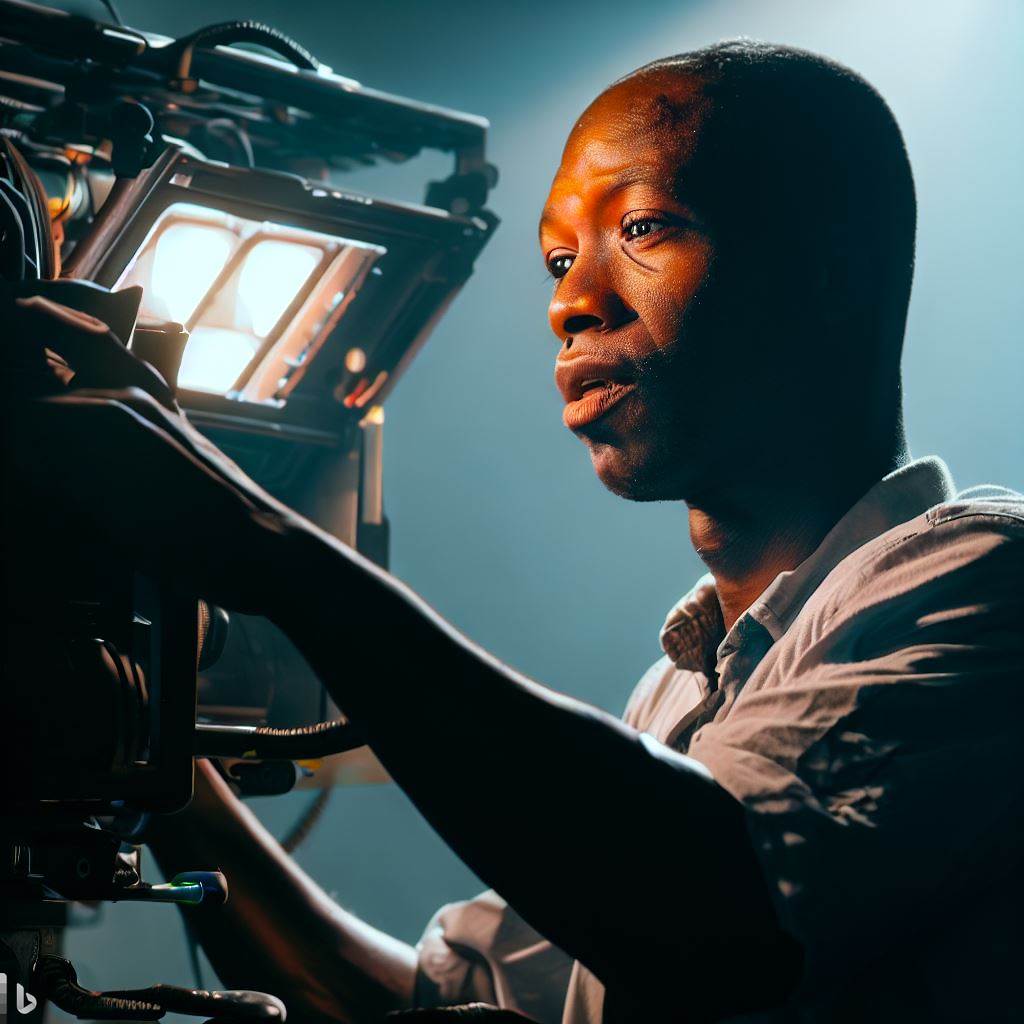Introduction
Let’s explore the role of lighting technicians in Nigeria’s film industry.
The art of filmmaking is a delicate tapestry woven together by numerous creative threads, each contributing to the final cinematic masterpiece.
In Nigeria’s film industry, lighting technicians play a crucial role in creating captivating movie scenes.
Lighting is vital in filmmaking as it sets the mood, highlights key elements, and enhances visual storytelling.
Among these crucial elements, the role of lighting technicians stands as a pillar of significance, often working behind the scenes, yet wielding immense power in shaping the visual narrative.
In the context of Nigeria’s burgeoning film industry, which has earned global recognition for its vibrant storytelling and unique cinematic voice, the contribution of lighting technicians cannot be understated.
This essay delves into the multifaceted dimensions of their role, shedding light on the challenges they face, the profound impact they make, and the pivotal role they play in driving the industry’s growth and garnering the recognition it rightfully deserves.
This blog post aims to delve into the significance of lighting technicians in Nigeria’s film industry and shed light on their responsibilities and contributions.
As we embark on this exploration, we unravel the intricacies and significance of the role of lighting technicians in Nigeria’s film landscape, celebrating their indispensable contribution to the evolution of African cinema.
Role of Lighting Technicians
In the Nigerian film industry, lighting technicians play a crucial role in creating visually stunning and impactful scenes.
Let’s explore their responsibilities and the importance of lighting in shaping the mood, tone, and aesthetics of a film.
Responsibilities of Lighting Technicians in the Film Industry
Lighting technicians are responsible for planning, setting up, and managing the lighting equipment for film shoots.
They collaborate closely with directors and cinematographers to achieve the desired visual effects.
These technicians design the lighting setups, considering factors such as the scene’s location, time of day, and desired ambiance.
They select the appropriate lights, filters, and diffusers to create the desired mood and tone for each scene.
During the shoot, lighting technicians operate the lights, adjusting their position, intensity, and color to ensure proper illumination and visual aesthetics.
They have a keen eye for detail, constantly checking for inconsistencies or shadows that could affect the quality of shots.
Lighting technicians also work closely with the electricians and grips to safely install and rig the lighting equipment, minimizing any potential risks.
They must have a good understanding of electrical systems and safety protocols to prevent accidents on set.
Importance of Lighting in Setting the Mood and Tone of a Scene
Lighting is a vital element in setting the mood and tone of a scene.
It helps create the desired emotional response from the audience and enhances the overall storytelling experience.
By manipulating the intensity, color, and direction of light, lighting technicians can create different atmospheres and convey specific emotions.
For example, soft, diffused lighting with warm tones can create a cozy and romantic atmosphere, while harsh lighting with cold tones can generate tension and suspense.
Lighting also serves as a powerful storytelling tool. It can reveal or conceal specific elements within a scene, emphasizing important details or guiding the viewer’s attention.
For instance, highlighting a character’s face in a dramatic close-up can enhance their emotional state and deepen the audience’s connection with the story.
Role of Lighting in Creating Visual Aesthetics and Enhancing Storytelling
Lighting technicians play a crucial role in creating visually stunning aesthetics that support the film’s narrative and enhance its impact on the audience.
The careful placement and manipulation of lights can transform ordinary locations into extraordinary settings.
Through the clever use of shadows, highlights, and contrasts, lighting technicians add depth, dimension, and texture to the visuals, creating a visually engaging and immersive experience.
Moreover, lighting techniques such as silhouetting or backlighting can add a sense of mystery, create silhouettes, or establish a character’s presence without revealing all their features.
These techniques add layers of visual intrigue and amplify the storytelling by allowing the audience to draw their own conclusions.
How Lighting Technicians Work Closely with Directors and Cinematographers
Lighting technicians work closely with directors and cinematographers to ensure the desired visual effects are achieved.
This collaborative effort is essential in bringing the director’s vision to life.
They discuss the mood, tone, and desired visual style for each scene with the director.
Lighting technicians take these discussions as guidance to design lighting setups that align with the director’s artistic vision and complement the cinematographer’s framing and camera movements.
Throughout the shoot, lighting technicians make adjustments based on the director and cinematographer’s feedback, ensuring the lighting supports the desired emotional impact and enhances the overall storytelling.
Lighting technicians play an integral part in Nigeria’s film industry.
They take on responsibilities such as planning and executing lighting setups, working closely with directors and cinematographers, and creating visually captivating aesthetics that elevate the storytelling experience for the audience.
Read: Optical Technician: A Growing Career in Nigeria
Challenges Faced by Lighting Technicians in Nigeria’s Film Industry
Lighting technicians play a crucial role in Nigeria’s film industry, also known as Nollywood.
They are responsible for creating the desired visual ambiance and enhancing the overall storytelling experience.
However, these technicians face unique challenges that hinder their ability to fully leverage their skills and contribute effectively to the industry.
Lack of Access to Modern Lighting Equipment and Technology
One major challenge faced by lighting technicians in Nigeria is the lack of access to modern lighting equipment and technology.
Due to limited availability and high costs, many technicians are forced to work with outdated and substandard equipment.
This hampers their ability to create high-quality lighting effects and limits their creative potential.
Without access to advanced lighting equipment, technicians struggle to meet the increasingly high standards set by the global film industry.
This gap in technological resources puts Nigerian filmmakers at a disadvantage when competing internationally, as lighting plays a significant role in creating a visually captivating film.
Insufficient Training and Education for Lighting Technicians
Another challenge faced by lighting technicians in Nigeria is the lack of sufficient training and education opportunities.
Many aspiring technicians enter the field without proper formal education, relying solely on practical experience.
This lack of theoretical knowledge limits their ability to understand and apply lighting principles effectively.
The absence of dedicated technical schools or specialized training programs for lighting technicians further exacerbates the problem.
Without access to formal education, technicians struggle to stay updated with the latest industry practices and advancements.
This limits their professional growth and hinders the overall development of the lighting profession in Nigeria.
Limited Funding and Resources for Lighting in Nigerian Films
One of the most significant challenges faced by lighting technicians in Nigeria is the limited funding and resources available for lighting in Nigerian films.
Compared to other production aspects, such as casting or special effects, lighting often receives a lower priority in budget allocation.
This limited funding affects the quality of lighting in Nigerian films, as technicians are forced to make do with scarce resources.
They often have to work with minimal equipment or rely on improvisation to achieve the desired lighting effects.
Consequently, the potential of lighting to enhance the storytelling and visual appeal of Nigerian films remains underutilized.
While lighting technicians in Nigeria’s film industry play a vital role in creating visually captivating films, they face several challenges that hinder their full potential.
The lack of access to modern lighting equipment and technology, insufficient training and education, and limited funding and resources all contribute to these challenges.
To address these issues, there is a need for increased investment in lighting equipment and technology, the establishment of specialized training programs, and a shift in industry perception to prioritize lighting in film budgets.
Only through these measures can Nigerian lighting technicians overcome their challenges and contribute fully to the growth and success of the country’s film industry.
Read: Finding an Optical Technician Job in Nigeria

Find Out More: From Trainee to Pro: A Casino Host’s Journey in Nigeria
Impact of Lighting Technicians on Nigerian Films
Lighting technicians play a crucial role in the Nigerian film industry, contributing to the success of films in various ways.
These skilled professionals are responsible for creating visually captivating scenes that enhance the storytelling process.
How skilled lighting technicians contribute to the success of Nigerian films
The impact of lighting technicians can be seen in several aspects of Nigerian films.
Firstly, skilled lighting technicians contribute to the success of Nigerian films by using their expertise to create remarkable lighting techniques.
They understand how different lighting setups can evoke specific emotions and enhance the atmosphere of a scene.
For example, they may use soft lighting to create a romantic ambiance or harsh lighting to convey a sense of suspense or urgency.
These techniques add depth and realism to the storytelling, captivating the audience.
Examples of remarkable lighting techniques used in popular Nigerian films
Numerous examples of remarkable lighting techniques can be found in popular Nigerian films.
In the movie “October 1,” directed by Kunle Afolayan, the lighting technicians skillfully used chiaroscuro lighting to create a film noir atmosphere, adding a touch of mystery to the narrative.
Additionally, in the film “The Wedding Party,” directed by Kemi Adetiba, expert lighting was employed during the wedding ceremony scenes, creating a warm and celebratory ambiance that enhanced the festive mood of the film.
The influence of lighting on the overall production value and audience experience
The influence of lighting on the overall production value and audience experience is significant.
Well-executed lighting can elevate the quality of a film, making it visually stunning and captivating.
It creates a visual language that complements the storytelling, drawing the audience into the narrative.
Whether it is the use of dramatic lighting to highlight the hero in an action-packed scene or the subtle illumination of a character’s face during an emotional moment, lighting sets the tone and enhances the viewer’s engagement with the film.
Contribution of lighting in showcasing Nigeria’s cultural heritage through film
Furthermore, lighting technicians contribute to showcasing Nigeria’s cultural heritage through film.
Nigeria is known for its rich cultural diversity, and films provide a platform to celebrate and preserve this heritage.
Lighting technicians skillfully use various lighting techniques to highlight cultural elements in Nigerian films.
For instance, in the film “The Figurine,” directed by Kunle Afolayan, lighting was instrumental in highlighting the aesthetic beauty of traditional Nigerian costumes and settings, allowing the audience to immerse themselves in the cultural experience.
In general, lighting technicians play a vital role in the Nigerian film industry.
Their expertise in creating remarkable lighting techniques contributes significantly to the success of Nigerian films.
Lighting enhances the overall production value, creating visually captivating scenes and enhancing the audience’s experience.
Furthermore, lighting is instrumental in showcasing Nigeria’s cultural heritage, adding another layer of authenticity and pride to the films.
The impact of lighting technicians on Nigerian films should not be underestimated, as they are integral to the industry’s growth and success.
Read: The Salary Guide for Hotel Receptionists in Nigeria
Publish Your Professional Profile, Business or Brand
Showcase your expertise, gain trust, and boost visibility instantly on Professions.ng.
Publish NowImproving the Role of Lighting Technicians in Nigeria’s Film Industry
Possible solutions and strategies to enhance the role of lighting technicians
In order to enhance the role of lighting technicians in Nigeria’s film industry, several solutions and strategies can be proposed:
- Increased investment in lighting equipment and technology is crucial for improving the role of lighting technicians.
- With better equipment, technicians can create high-quality lighting effects that enhance the overall visual appeal and impact of films.
- The establishment of specialized training programs for lighting technicians is necessary to enhance their skills and knowledge.
- These programs should focus on both the technical aspects of lighting and the creative aspects of using lighting to convey specific moods and atmospheres.
- Training programs should also emphasize the importance of working efficiently and collaboratively on film sets.
- Collaboration and knowledge-sharing among industry professionals is essential for lighting technicians to learn from each other and improve their craft.
- Regular workshops, seminars, and forums can be organized to facilitate networking and exchange of ideas among lighting technicians.
- Encouraging industry associations to create mentorship programs can also be beneficial for aspiring lighting technicians.
- Experienced professionals can provide guidance and support to newcomers, helping them develop their skills and gain practical experience.
- Promoting the role of lighting technicians within the film industry is crucial to attracting talented individuals to this profession.
By implementing these proposed solutions and strategies, the role of lighting technicians in Nigeria’s film industry can be significantly enhanced, leading to visually captivating and impactful films.
Read: Coating Technician Internships: How to Get Started in Nigeria
Conclusion
Lighting technicians play a crucial role in Nigeria’s film industry.
They are responsible for creating the right mood and atmosphere, enhancing the visual aesthetics, and ensuring that the actors and scenes are properly illuminated.
Without their expertise, the quality of Nigerian films would suffer.
It is important to recognize and appreciate the potential for growth and improvement in the role of lighting technicians.
As technology advances and new techniques are developed, lighting professionals have the opportunity to further enhance the overall cinematic experience in Nigerian films.
This includes exploring new lighting styles, experimenting with different equipment, and staying updated with industry trends.
However, for the Nigerian film industry to truly thrive, continued support and recognition for lighting professionals are essential.
They need adequate resources, training, and opportunities to showcase their skills.
Production companies, filmmakers, and stakeholders should invest in the development and promotion of lighting technicians.
By acknowledging the important role lighting technicians play in Nigeria’s film industry and providing them with the support they need, we can ensure the continuous growth and success of the Nigerian film industry.
Let us appreciate and celebrate the talents and contributions of lighting professionals in Nigerian cinema, recognizing their vital role in shaping the visual storytelling that captivates audiences.




